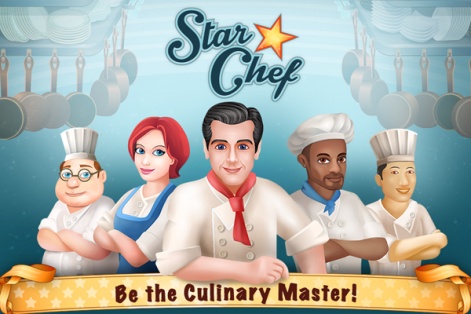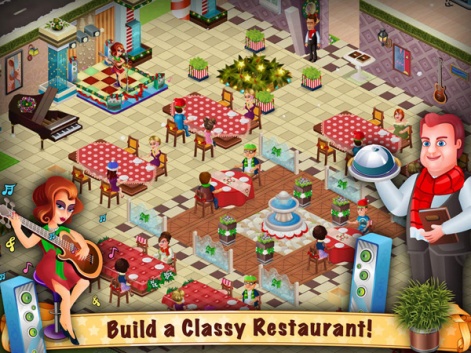Last time we spoke to Indian developer 99Games, it was having a local hit on Windows Phone with its film tie-in action title Dhoom:3 The Game.
Ten months on, however, and its current success offers a different experience in every way.
Star Chef is an iOS game aimed at the female social mobile games around the world.
To-date, the Udupi-based developer has accumulated 400,000 downloads, 40,000 daily active players, and more importantly is seeing revenue growing at 25 percent quarter-on-quarter.
We spoke to senior producer Shilpa Bhat to find out more about the game and its developer's plans.
Pocket Gamer: What was the inspiration for Star Chef?
Shilpa Bhat: Star Chef is a lovingly-crafted cooking and restaurant management game. We wanted to build a high quality social freemium game catering to the global audience, especially targeting women in the 25-60 year age group.
Being cooking enthusiasts and followers of Chef TV series, our team felt there was a huge void for quality chef and restaurant management games on mobile. There are slow-paced farming games and fast-paced time management cooking games like the Diner Dash series, but nothing like Star Chef.
Yet the success of farming games like Hay Day demonstrates the monetisation potential of a well-made social freemium game.
It is very different to your previous game Dhoom:3, though.
Yes, Star Chef is very different to our earlier success Dhoom:3 and belongs to a totally different genre and caters to an entirely new audience. Dhoom:3 was targeted towards Indian audience and Dhoom movie fans.

At 99Games, we have two business models running in parallel. One caters to Indian market with licensed IP (e.g. Dhoom:3) and other targets the global audience with our own IP (e.g. Star Chef).
What platforms have you released the game on and in which countries has it been most popular?
The game is made for iOS-only. We followed an iPad-first strategy during pilot run and released the game worldwide on 21 Aug 2014 with iPhone support.
The game is getting great response in the US, UK, Australia, Germany, Canada, Russia, France, Italy.
The game is localised in English, French, German, Italian, Spanish and Russian, with plans for Chinese localisation to coincide with Chinese New Year.
Did you try to make the game work for specific territories or did you go for a more global appeal?
We went for a global appeal to reach a wider audience. The game sentiments are based on a chef who works on her culinary skills to become a master chef. She would explore different cuisines around the world.

The game includes wide variety of cuisines and over 100 dishes that the player explores over a period of time as she rises up the ranks to become the star chef. The characters in the game are also designed to bring out a global feel to the game.
That said, we do have plans for some specific cultural and country themes which will be released as updates next year.
Live operations are key to these type of games so how have you tried to keep your players engaged and coming back to play?
The game offers several social elements and real-time trading between players. Player needs to aim for a higher chef designations and maintain the restaurant star rating; this brings some competitive psychology into the game.
Social help features, Push notifications and deep-linking are used to increase the engagement and make them come back to the game.
Regular game updates and feature enhancements have also helped with the retention. Most important of all, we have built a scalable backend system to scale this game to millions of online players.
What's your approach been in terms of finding an audience with paid UA?
During pilot run, to get some traction and decent number of players so as to measure the game analytics, we did paid UA, though in a small scale.
We have worked continuously to improve viral elements of the game and have introduced various social features where players would benefit in the game by adding friends.
The game has scaled from $0 to $65,000 monthly revenue within a short period of time.Shilpa Baht
We gave special attention to our customer support as well to retain these initial acquired users. These happy users brought their friends and family to the game. We also have put together a community on Facebook and are observing players from different geographies getting involved.
Soon after the launch, the game was prominently featured in India and Middle East countries, adding more organic users. However, we had to continue UA in other key geographies.
Our game's viral factor has improved from 0.2 to 0.75 to-date, where 75 percent of our players are organic.
What's been your main focus in terms of monetisation?
For Star Chef, IAPs are our main focus in terms of monetisation. The game has scaled from $0 to $65,000 monthly revenue within a short period of time.
However, advertising is still needed to monetise non-paying users. We did not want advertisements to affect the gameplay experience in initial levels, especially of potential payers, so ads are shown only to non-payers at higher levels.
What are your future plans for the game?
We know we have a solid game and are speaking to various strategic investors to take this game to a global scale.
And from a feature and gameplay perspective, we have several interesting updates for the game in 2015 that are already in production.
Thanks to Shilpa for her time. You can download Star Chef from the App Store [link].

















